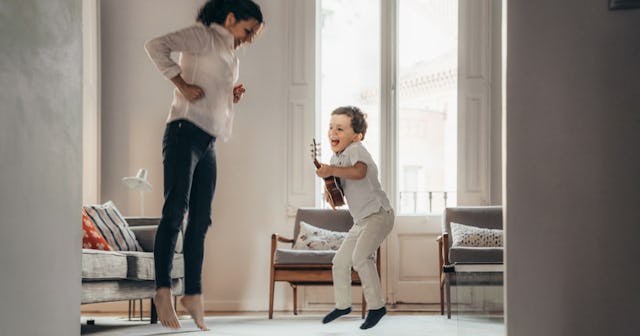So You Want To Raise A Music Lover — Here’s A Great Way To Start

As parents, we all have hopes for the types of people our children will someday become — kind, well-adjusted, reasonably skilled adults who can be functional members of society and eventually stop watching unboxing videos online. And most of us can also agree that we want our kids to love music, whether they’re making it, dancing to it, or just enjoying it. But how?
Sure, it’s easy to dress our littles in rockstar T-shirts or take endless videos of them singing their own personal remix of the ABCs, but it can be daunting to figure out how to instill a lifelong love of music in our tiny humans. That’s why we love Music Together, an early childhood music education program that aims to make kids — and parents — more musical through play-based learning. Here are five reasons these classes change the game:
They’re Everywhere (Read: Super Convenient)
Music Together offers classes in over 3,000 communities and 40 countries, and you can find one near you with their convenient class locator. Even better, all Music Together classes, regardless of location, use the same music and the same research-backed curriculum, so you’ll get the exact same skills and lasting benefits no matter where you sign up for classes.
They’re Just as Much for Parents as for Kids
Parents and caregivers play an integral part in the Music Together community. The creators of Music Together know from research that when kids are exposed to music on a daily basis from a young age, it becomes a part of their life… and that children learn best when music-making is modeled in the home, regardless of their grown-ups’ musical abilities. Translation: Even if you belt off-key show tunes in the shower so loudly that your neighbor bangs on the wall, you are not only qualified, but the most qualified, to teach your child to love music! Music Together even offers genius parenting hacks that use music to get you out of tantrums, difficult bedtime routines, and more.
They’re Seriously Fun
I did Music Together with my first son, who’s now 10. I can personally attest to the fact that the Music Together class was one of the best parts of my week. The original songs (dare I say, they are bops!) got stuck in my head on a regular basis. I was maybe a little too eager to impress the twenty-something instructor with my maraca-shaking skills, and my very shy toddler who barely participated in the sing-a-longs has since grown into an almost-preteen who steals my phone to listen to Spotify 24/7, and who is currently forming a rock band with his 5th grade friends. And it all started with Music Together.
The Curriculum is Based on Decades of Research
Literally, decades! Music Together was founded in 1987 by a music teacher and early childhood education researcher who teamed up to find a better way to engage kids in musical learning. They studied neuroscience and psychology texts about how childrens’ brains process and organize music and then developed a class that specifically caters to how kids learn. The curriculum combines singing, movement, rhythm, and music-making in a developmentally-appropriate, play-based environment. Studies about Music Together have concluded that the classes not only help kids love music, but also benefit their social-emotional development, motor and pre-reading skills, and help toddlers get ready for Kindergarten!
They Don’t Care if You’re Talented
One of the central principles of Music Together is that all children are born musical — and that musicality doesn’t depend on talent. So this isn’t a class just for wannabe pop stars and music prodigies (although all are welcome!) The goal of a Music Together class is to teach basic music competence to kids and caregivers in a way that is fun and intuitive, in an environment that is warm and supportive. When it comes to filling your child’s life with music, what more could you ask for?
Music Together is a fun, research-based program specially designed to help kids from infancy to age 8 — and the grownups who love them — develop their innate musical ability. Click here to find a class near you!
This article was originally published on